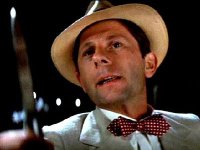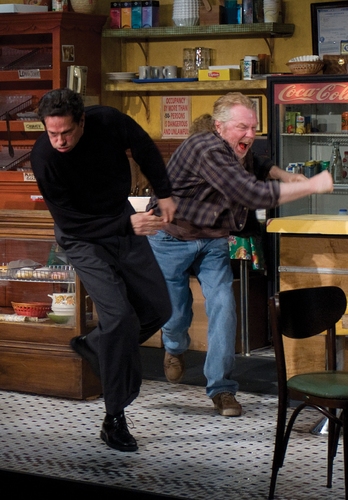 Much has been written about Roman Polanski since his arrest in Zurich last week, but one aspect of the story that has struck me forcibly in the last couple of days is the widening fissure between Hollywood celebrities, most of whom have lined up more or less solidly behind Polanski, and the public at large, which appears unwilling to cut him any slack at all. Moreover, a growing number of decidedly unusual subjects, including Kevin “Silent Bob” Smith and Eugene Robinson of the Washington Post, are choosing to break cultural ranks and condemn Polanski.
Much has been written about Roman Polanski since his arrest in Zurich last week, but one aspect of the story that has struck me forcibly in the last couple of days is the widening fissure between Hollywood celebrities, most of whom have lined up more or less solidly behind Polanski, and the public at large, which appears unwilling to cut him any slack at all. Moreover, a growing number of decidedly unusual subjects, including Kevin “Silent Bob” Smith and Eugene Robinson of the Washington Post, are choosing to break cultural ranks and condemn Polanski.
What triggered this split, and what is its significance? I’ll be talking about these questions–and supplying a bit of historical perspective–in my “Sightings” column for Saturday’s Wall Street Journal. Pick up a copy of tomorrow’s paper and see what I have to say.
UPDATE: Read the whole thing here.
Archives for October 2, 2009
TT: Serious entertainment, Chicago-style
I’m back on Broadway after a long absence, but you wouldn’t know it by this week’s Wall Street Journal drama column, in which I rave (albeit with some judicious reservations) about two new plays, A Steady Rain and Superior Donuts, that both originated in Chicago. Here’s an excerpt.
* * *
 Chicago has come to Broadway–with a great big bang. Two new plays by Chicago-based writers, Keith Huff’s “A Steady Rain” and Tracy Letts’ “Superior Donuts,” opened across the street from one another this week. Not only are both shows set to become box-office hits, but both are characteristic of Chicagoland theater at its gritty, no-nonsense best. The difference is that while “Superior Donuts” is a straight Chicago-to-New-York transfer of the Steppenwolf Theatre Company production, “A Steady Rain” is a made-for-Broadway remounting that features two movie stars, Daniel Craig (“Casino Royale”) and Hugh Jackman (“X-Men”), whose real-life accents are unmistakably un-American.
Chicago has come to Broadway–with a great big bang. Two new plays by Chicago-based writers, Keith Huff’s “A Steady Rain” and Tracy Letts’ “Superior Donuts,” opened across the street from one another this week. Not only are both shows set to become box-office hits, but both are characteristic of Chicagoland theater at its gritty, no-nonsense best. The difference is that while “Superior Donuts” is a straight Chicago-to-New-York transfer of the Steppenwolf Theatre Company production, “A Steady Rain” is a made-for-Broadway remounting that features two movie stars, Daniel Craig (“Casino Royale”) and Hugh Jackman (“X-Men”), whose real-life accents are unmistakably un-American.
Why does this matter? Because Messrs. Craig and Jackman are playing a pair of beat cops from the south side of Chicago, the first slightly bent and the second crooked as a twice-bought pol, who talk the spiky talk of the streets where they grew up (“I known the guy since kinnygarten”). In a two-man play, especially one written by a sharp-eared Chicago author whose father-in-law and brother-in-law were policemen, American audiences have a right to expect the actors to sound like the characters they’re playing. Mr. Craig, a British actor with classical training and a wide variety of stage experience, manages this tricky task with cool aplomb, tunnelling so far inside his part that it’s easy to forget who’s playing it. Mr. Jackman does his damnedest to keep up, but Australian vowels occasionally peep through the nasal snarl of his ersatz Chicago accent, and though he gives a strong, satisfying performance, you’re always aware that it is a performance.
Not that this diminishes the gut-level impact of “A Steady Rain,” an irresistibly forceful exercise in noir-style tandem storytelling in which the hushed audience watches Mr. Jackman’s character hurtle headlong toward the abyss of self-destruction…
If “A Steady Rain” is the theatrical equivalent of a Scott Turow novel, then “Superior Donuts” is “You Can’t Take It With You” rewritten by David Mamet, a dark comedy about a workplace “family” of charmingly wacky characters who suddenly find themselves caught in the deadly undertow of reality. The setting is a rundown six-stool donut shop in uptown Chicago whose proprietor, Arthur Przybyszewski (played to perfection by Michael McKean), is a burnt-out hippie whose hard shell of cynicism is cracked open by a young black man (Jon Michael Hill) who fast-talks his way into a job behind the counter. Much of what happens thereafter is obvious, but not all–the audience at the preview I saw gasped twice, both times loudly, at a surprising plot twist–and Mr. Letts, who is best known on Broadway as the author of “August: Osage County,” takes scrupulous care to balance laughter and sorrow in exactly the right proportions….
* * *
Read the whole thing here.
TT: Almanac
“Indefinitiveness is an element of true music–I mean of true musical expression. Give to it any undue decision–imbue it with any very determinate tone–and you deprive it, at once, of its ethereal, its ideal, its intrinsic and essential character. You dispel its luxury of dream. You dissolve the atmosphere of the mystic upon which it floats.”
Edgar Allan Poe, Marginalia
